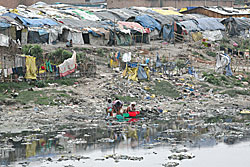 MIN RATNA BAJRACHARYA |
Largely as a result of a precipitous fall in exports, China is likely to continue to grow, but at a much slower pace than the 11-12 per cent annual growth of recent years. Unless something is done, the crisis will throw as many as 200 million additional people into poverty.
This global crisis requires a global response, but, unfortunately, responsibility for responding remains at the national level. Each country will try to design its stimulus package to maximise the impact on its own citizens?not the global impact.
This is one of several important messages to emerge from a United Nations Experts Commission on the global economic crisis. The report supports many of the G-20 initiatives, but it urges stronger measures focused on developing countries. For instance, while it is recognised that almost all countries need to undertake stimulus measures (we're all Keynesians now), many developing countries do not have the resources to do so. Nor do existing international lending institutions.
But if we are to avoid winding up in another debt crisis, some, perhaps much, of the money will have to be given in grants. And, in the past, assistance has been accompanied by extensive "conditions," some of which enforced contractionary monetary and fiscal policies?just the opposite of what is needed now?and imposed financial deregulation, which was among the root causes of the crisis.
In many parts of the world, there is a strong stigma associated with going to the IMF. And there is dissatisfaction not just from borrowers, but also from potential suppliers of funds. The sources of liquid funds today are in Asia and the Middle East, but why should these countries contribute money to organisations in which their voice is limited and which have often pushed policies that are antithetical to their values and beliefs?
Many of the governance reforms proposed for the IMF and the World Bank?affecting, most obviously, how their heads are chosen?finally seem to be on the table. But the reform process is slow, and the crisis will not wait. It is thus imperative that assistance be provided through a variety of channels, in addition to, or instead of, the IMF, including regional institutions. New lending facilities could be created, with governance structures more consonant with the twenty-first century.
One of the more important medium-term initiatives urged by the UN Commission is the creation of a global economic coordinating council, which would not only coordinate economic policy, but would also assess impending problems and institutional gaps. As the downturn deepens, several countries may, for example, face bankruptcy. But we still do not have an adequate framework for dealing with such problems.
And the US dollar reserve-currency system?the backbone of the current global financial system?is fraying. China has expressed concerns, and the head of its central bank has joined the UN Commission in calling for a new global reserve system. The UN Commission argues that addressing this old issue (raised more than 75 years ago by Keynes) is essential if we are to have a robust and stable recovery.
Project Syndicate
Joseph E. Stiglitz, Professor of Economics at Columbia University, chairs a Commission of Experts, appointed by the President of the UN General Assembly, on reforms of the international monetary and financial system.


